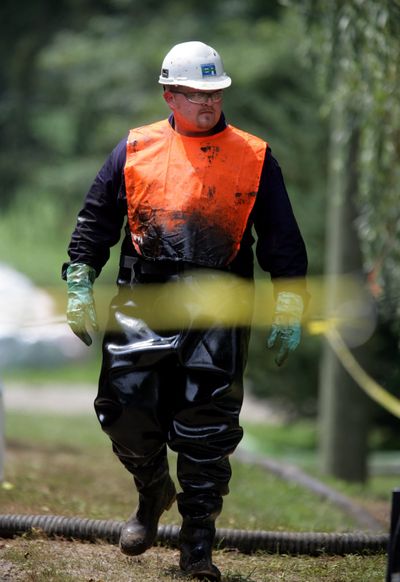Feds say they warned oil pipeline operator

WASHINGTON – The Obama administration said Saturday it repeatedly warned Enbridge Energy Partners about safety issues along its Lakehead pipeline system, even calling company officials to Washington earlier this year for a meeting on what it deemed “a series of major failures.”
Some of those concerns specifically involved Line 6B running from Griffith, Ind., to Sarnia, Ont., a section of which apparently ruptured early last week, sending hundreds of thousands of gallons of crude oil into a tributary of the Kalamazoo River.
Last week, the Detroit Free Press reported on letters sent to Enbridge questioning the discontinuation of corrosion monitoring systems along Line 6B and the results of tests done along the line that found “metal loss anomalies” serious enough that the Canada-based company planned to replace a section of pipe.
In statements on Saturday, the U.S. Department of Transportation – which oversees oil pipelines through its Pipeline and Hazardous Materials Safety Administration – raised additional concerns about Enbridge’s record.
A senior Transportation Department official said the administration “repeatedly warned Enbridge in no uncertain terms that it needed to get its act together with regard to the safety of its Lakehead pipeline system.” The official said PHMSA officials met with Enbridge senior leadership in February of this year to tell them to “overhaul their entire approach to safety.”
“Safety is our No. 1 priority,” said Bizunesh Scott, chief counsel for PHMSA. “That’s why we repeatedly pushed Enbridge to address the safety and performance of its entire Lakehead pipeline system.”
A comment from Enbridge wasn’t immediately available Saturday. The company, while taking full responsibility for the spill at Marshall, has said it spends millions on protecting and maintaining its 1,900-mile Lakehead system.
According to a timeline provided by federal officials, PHMSA has conducted more than four dozen inspections of Enbridge in the last 10 years.
At the February meeting in Washington, Enbridge senior leaders were told to review their safety methodologies and report back to PHMSA. A follow-up meeting was held in March with members of PHMSA’s Central Region staff.
Internal corrosion is considered perhaps the most insidious threat to pipelines. No cause has yet been released for the spill in Michigan, where the pipe that apparently ruptured dated to 1969.